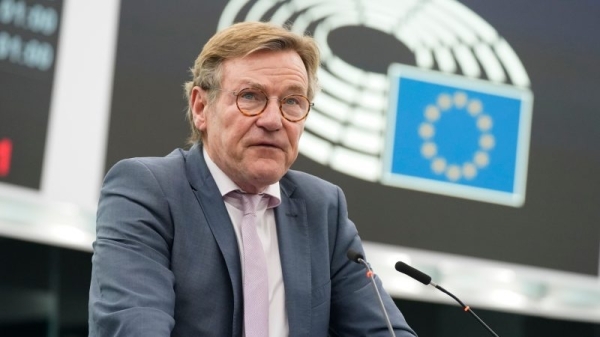EU Parliament criticises Commission amid rise in borrowing costs

As the EU’s borrowing costs increase, the European Parliament has called on the Commission to clarify what this means for the EU budget, concerned that spending on policy priorities might be hurt due to a lack of funding.
With rising interest rates, the common debt that the EU needs to borrow from financial markets to finance its post-pandemic recovery is costing more than anticipated, putting a strain on the EU budget.
On Wednesday (10 May), the European Parliament will vote on a resolution to deal with the strain.
The resolution cites “growing concern” about the fact that “the amounts programmed for the repayment of [the EU’s pandemic recovery instrument’s] borrowing costs are likely to be insufficient, particularly in 2023 and 2024,” urging the European Commission to provide “timely and detailed information” on the estimated borrowing costs.
According to the resolution’s rapporteur Johan Van Overtveldt (ECR), one of the main problems is that the Commission does not communicate clearly about how large the effect of the increased borrowing costs is going to be.
“It makes us a little angry with the Commission,” the former Belgian finance minister told EURACTIV, saying that the numbers the Parliament received were changing all the time.
An EU Commission spokesperson told EURACTIV that the Commission was currently working on an updated forecast of the the projected borrowing costs.
“Forecasting interest rates for 4 years is a particularly difficult exercise, especially in the current volatile environment,” he said.
The spokesperson also stressed that the Commission had “always been in an open and transparent dialogue with the European Parliament and Member States in the Council,” and that the Parliament had most recently been updated at the end of April.
Increasing costs
For now, nobody seems to know exactly how large the effect of the increased borrowing costs will be. Van Overtveldt was sure that “one way or the other it will be a substantial amount.”
His concern is backed up by the recent data on the EU’s bond issuance. A year ago, on 11 May 2022, the EU Commission was able to issue three-year bonds with a real interest rate of 0.82% and 30-year bonds with an interest rate of 1.84%.
On Tuesday (9 May), the Commission did a similar transaction, but the three-year bonds now went into the market with a real interest rate of 2.84% and the 30-year bonds were accepted by markets at an interest rate of 3.48%.
Back in June 2021, the first bond issuance for the EU’s recovery instrument could place 10-year bonds at an interest rate of 0.09%.
Applying these additional percentage points to the hundreds of billions of euros that the EU is yet to borrow, the additional cost for the EU budget could amount to several billion euros per year.
This has the members of the EU Parliament (MEPs) worried. Due to the crises that the EU had to react to, MEPs fear that there are no more unallocated margins in the EU’s budget that could be used to pay the rising borrowing costs.
“Without the necessary action being taken, the increasing […] borrowing costs are likely to limit severely the EU budget’s ability to finance the Union’s priorities and policies,” the resolution reads.
It would be even more difficult to fund new European policy priorities like the European Chips Act, the Parliament’s resolution warns.
New own resources or budget cuts
As the EU is legally not allowed to write a deficit, Johan Van Overtveldt sees three options to deal with the problem: More own resources for the EU, increased member state contributions, or a budget reduction for some EU programmes.
While the resolution focuses on new own resources, calling for a new Commission proposal on own resources “as soon as possible and no later than the third quarter of 2023”, the resolution’s rapporteur is less enthusiastic about additional EU resources.
“My personal opinion is diverging,” he told EURACTIV. “I’d prefer to take a look at the expenditure.”
That’s why Van Overtveldt was not yet sure whether he was going to vote for his own report when he talked to EURACTIV on Tuesday (9 May) afternoon, saying that he was still weighing up whether to vote in favour or abstain.
However, his decision is unlikely to tip the balance in one way or the other. In the Parliament’s budget committee, his resolution was approved by a wide margin, making an adoption of the report by the Parliament’s plenary on Wednesday (10 May) highly likely.
According to a Commission spokesperson, a proposal for the 2024 budget as well as for the mid-term review of the EU’s long-term budget will be presented before 30 June.
“In the meantime, it is worth recalling that the existing legal framework provides for the necessary mechanisms to ensure that the Union will cover in all circumstances its obligations towards bondholders,” he said.
Read more with EURACTIV



